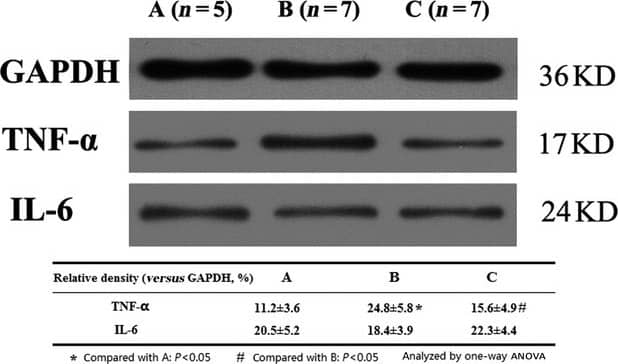Porcine TNF-alpha Antibody Summary
Arg78-Leu232
Accession # P23563
Applications
Please Note: Optimal dilutions should be determined by each laboratory for each application. General Protocols are available in the Technical Information section on our website.
Scientific Data
 View Larger
View Larger
Cytotoxicity Induced by TNF‑ alpha and Neutralization by Porcine TNF‑ alpha Antibody. Recombinant Porcine TNF-a (Catalog # 690-PT) induces cytotoxicity in the the PK-15 porcine kidney epithelial cell line in a dose-dependent manner (orange line). Cytotoxicity elicited by Recombinant Porcine TNF-a (0.05 ng/mL) is neutralized (green line) by increasing concentrations of Mouse Anti-Porcine TNF-a Monoclonal Antibody (Catalog # MAB6903). The ND50 is typically 0.005-0.02 µg/mL in the presence of the metabolic inhibitor actinomycin D (1 µg/mL).
 View Larger
View Larger
TNF‑ alpha in Porcine PBMCs. TNF-a was detected in immersion fixed porcine peripheral blood mononuclear cells treated with calcium ionomycin and PMA using Mouse Anti-Porcine TNF-a Monoclonal Antibody (Catalog # MAB6903) at 25 µg/mL for 3 hours at room temperature. Cells were stained using the NorthernLights™ 557-conjugated Anti-Mouse IgG Secondary Antibody (red; Catalog # NL007) and counterstained with DAPI (blue). Specific staining was localized to cytoplasm. View our protocol for Fluorescent ICC Staining of Non-adherent Cells.
 View Larger
View Larger
Detection of Porcine TNF-alpha by Western Blot Protein expression of TNF-alpha and IL-6 were detected by Western blot. (A) Sham-operation group; (B) CME group; (C) treatment group. Image collected and cropped by CiteAb from the following open publication (https://pubmed.ncbi.nlm.nih.gov/25130514), licensed under a CC-BY license. Not internally tested by R&D Systems.
 View Larger
View Larger
Detection of Porcine TNF-alpha by Immunohistochemistry-Paraffin Protein expression of TNF-alpha and IL-6 were detected by immunohistochemistry (×400). (A) Sham-operation group; (B) CME group; (C) treatment group. Image collected and cropped by CiteAb from the following open publication (https://pubmed.ncbi.nlm.nih.gov/25130514), licensed under a CC-BY license. Not internally tested by R&D Systems.
Preparation and Storage
- 12 months from date of receipt, -20 to -70 °C as supplied.
- 1 month, 2 to 8 °C under sterile conditions after reconstitution.
- 6 months, -20 to -70 °C under sterile conditions after reconstitution.
Background: TNF-alpha
Tumor necrosis factor alpha (TNF-alpha ), also known as cachectin and TNFSF2, is the prototypic ligand of the TNF superfamily. It is a pleiotropic molecule that plays a central role in inflammation, apoptosis, and immune system development. TNF-alpha is produced by a wide variety of immune and epithelial cell types (1, 2). Porcine TNF-alpha consisits of a 35 amino acid (aa) cytoplasmic domain, a 21 aa transmembrane segment, and a 176 aa extracellular domain (ECD) (3). Within the ECD, porcine TNF-alpha shares 69%‑86% aa sequence identity with bovine, canine, cotton rat, equine, feline, human, mouse, rat, and rhesus TNF-alpha. The 26 kDa type 2 transmembrane protein is assembled intracellularly to form a noncovalently linked homotrimer (4). Ligation of this complex induces reverse signaling that promotes lymphocyte costimulation but diminishes monocyte responsiveness (5). Cleavage of membrane bound TNF-alpha by TACE/ADAM17 releases a 55 kDa soluble trimeric form of TNF-alpha (6, 7). TNF-alpha trimers bind the ubiquitous TNF RI and the hematopoietic cell-restricted TNF RII, both of which are also expressed as homotrimers (1, 8). TNF-alpha regulates lymphoid tissue development through control of apoptosis (2). It also promotes inflammatory responses by inducing the activation of vascular endothelial cells and macrophages (2). TNF-alpha is a key cytokine in the development of several inflammatory disorders (9). It contributes to the development of type 2 diabetes through its effects on insulin resistance and fatty acid metabolism (10, 11).
- Idriss, H.T. and J.H. Naismith (2000) Microsc. Res. Tech. 50:184.
- Hehlgans, T. and K. Pfeffer (2005) Immunology 115:1.
- Pauli, U. et al. (1989) Gene 81:185.
- Tang, P. et al. (1996) Biochemistry 35:8216.
- Eissner G. et al. (2004) Cytokine Growth Factor Rev. 15:353.
- Black, R.A. et al. (1997) Nature 385:729.
- Moss, M.L. et al. (1997) Nature 385:733.
- Loetscher, H. et al. (1991) J. Biol. Chem. 266:18324.
- Clark, I.A. (2007) Cytokine Growth Factor Rev. 18:335.
- Romanatto, T. et al. (2007) Peptides 28:1050.
- Hector, J. et al. (2007) Horm. Metab. Res. 39:250.
Product Datasheets
Citations for Porcine TNF-alpha Antibody
R&D Systems personnel manually curate a database that contains references using R&D Systems products. The data collected includes not only links to publications in PubMed, but also provides information about sample types, species, and experimental conditions.
3
Citations: Showing 1 - 3
Filter your results:
Filter by:
-
TREM2 suppresses the proinflammatory response to facilitate PRRSV infection via PI3K/NF-kappaB signaling
Authors: Z Zhu, X Zhang, W Dong, X Wang, S He, H Zhang, X Wang, R Wei, Y Chen, X Liu, C Guo
PLoS Pathog., 2020-05-13;16(5):e1008543.
Species: Porcine
Sample Types: Cell Lysates, Whole Cells
Applications: ICC, Immunoprecipitation, Western Blot -
Systemic cytokine profile in feeder pigs suffering from natural postweaning multisystemic wasting syndrome (PMWS) as determined by semiquantitative RT-PCR and flow cytometric intracellular cytokine detection.
Authors: Sipos W, Duvigneau JC, Willheim M, Schilcher F, Hartl RT, Hofbauer G, Exel B, Pietschmann P, Schmoll F
Vet. Immunol. Immunopathol., 2004-05-01;99(1):63-71.
Species: Porcine
Sample Types: Whole Cells
Applications: Flow Cytometry -
beta -Glucan-Induced IL-10 Secretion by Monocytes Triggers Porcine NK Cell Cytotoxicity
Authors: Leen Hermans, Steffi De Pelsmaeker, Sofie Denaeghel, Eric Cox, Herman W. Favoreel, Bert Devriendt
Frontiers in Immunology
FAQs
No product specific FAQs exist for this product, however you may
View all Antibody FAQsIsotype Controls
Reconstitution Buffers
Secondary Antibodies
Reviews for Porcine TNF-alpha Antibody
Average Rating: 4 (Based on 1 Review)
Have you used Porcine TNF-alpha Antibody?
Submit a review and receive an Amazon gift card.
$25/€18/£15/$25CAN/¥75 Yuan/¥2500 Yen for a review with an image
$10/€7/£6/$10 CAD/¥70 Yuan/¥1110 Yen for a review without an image
Filter by:














